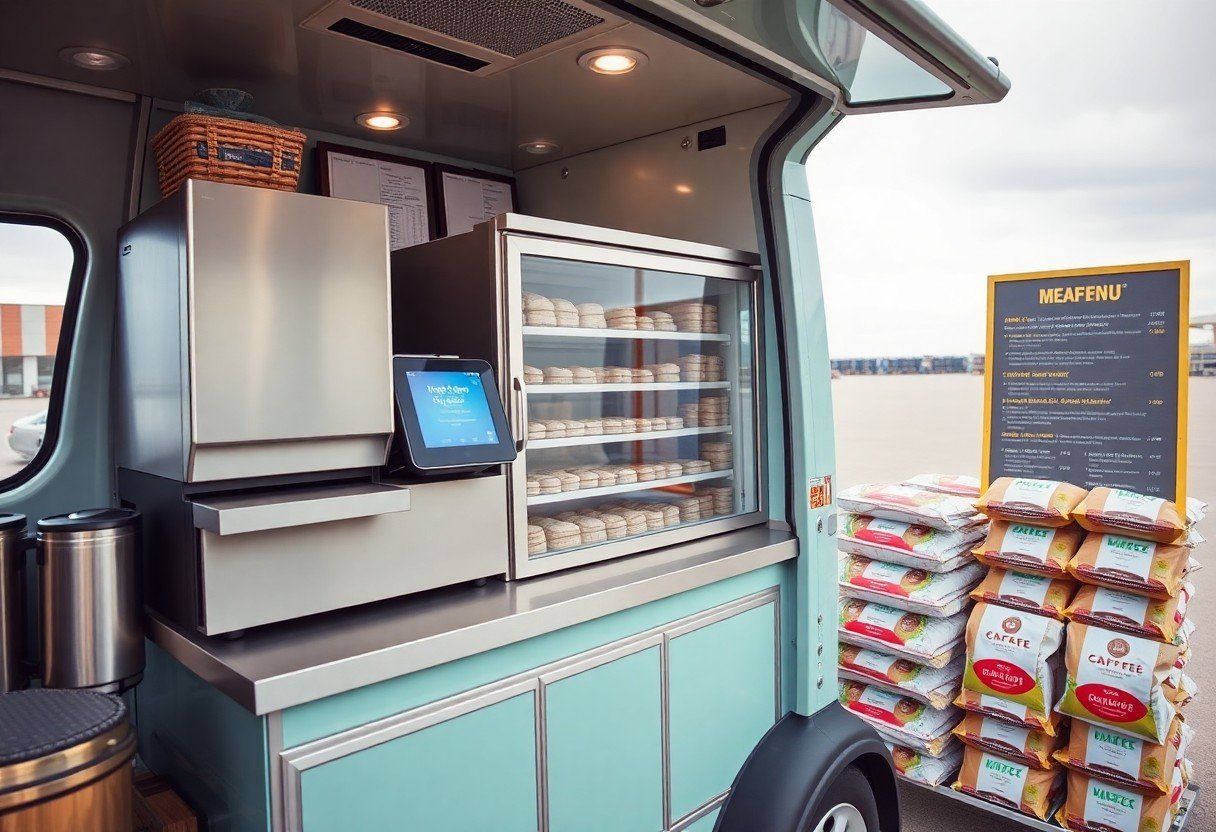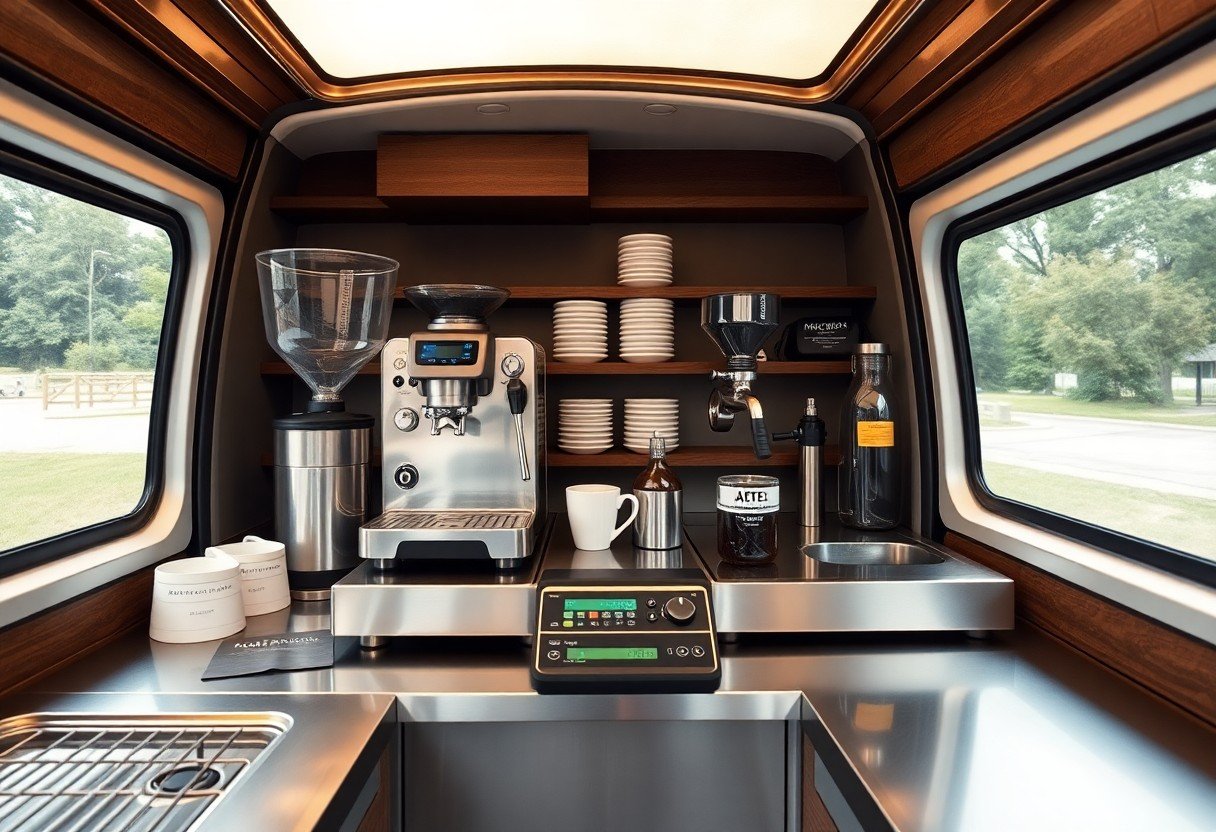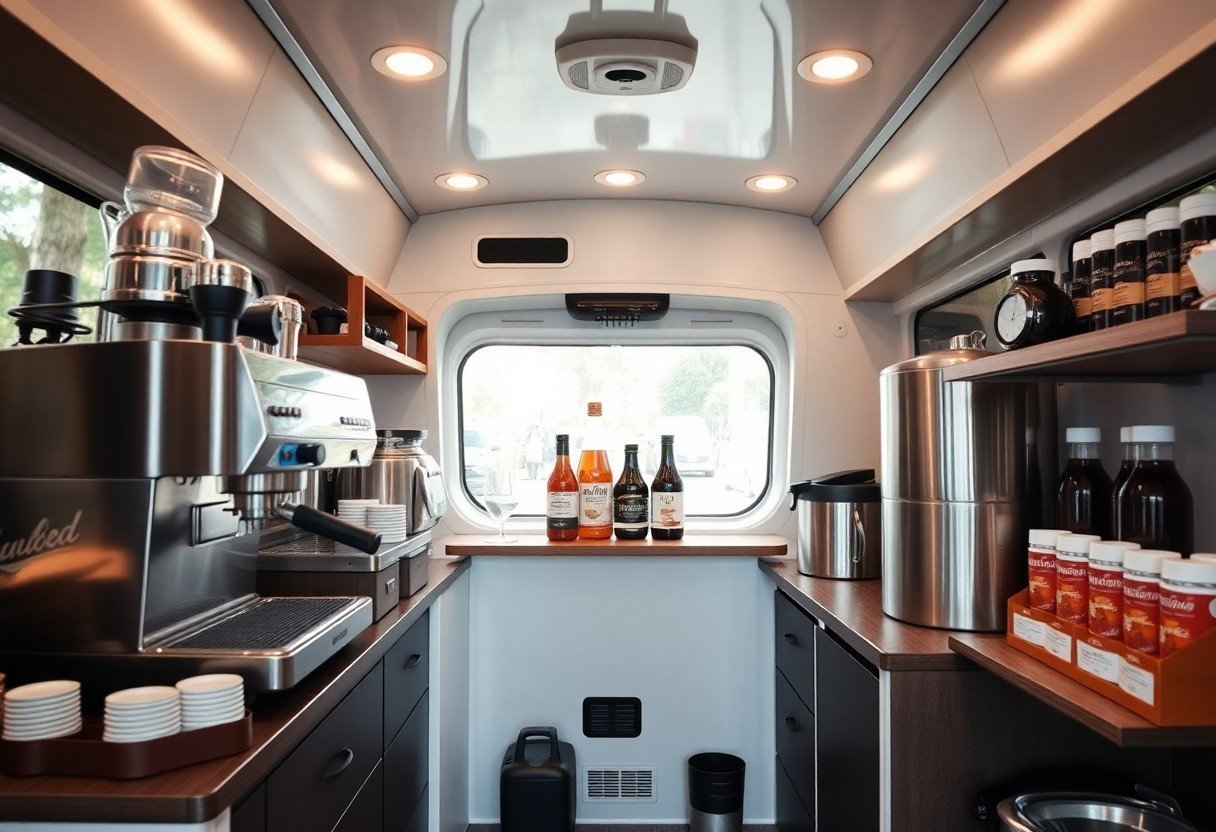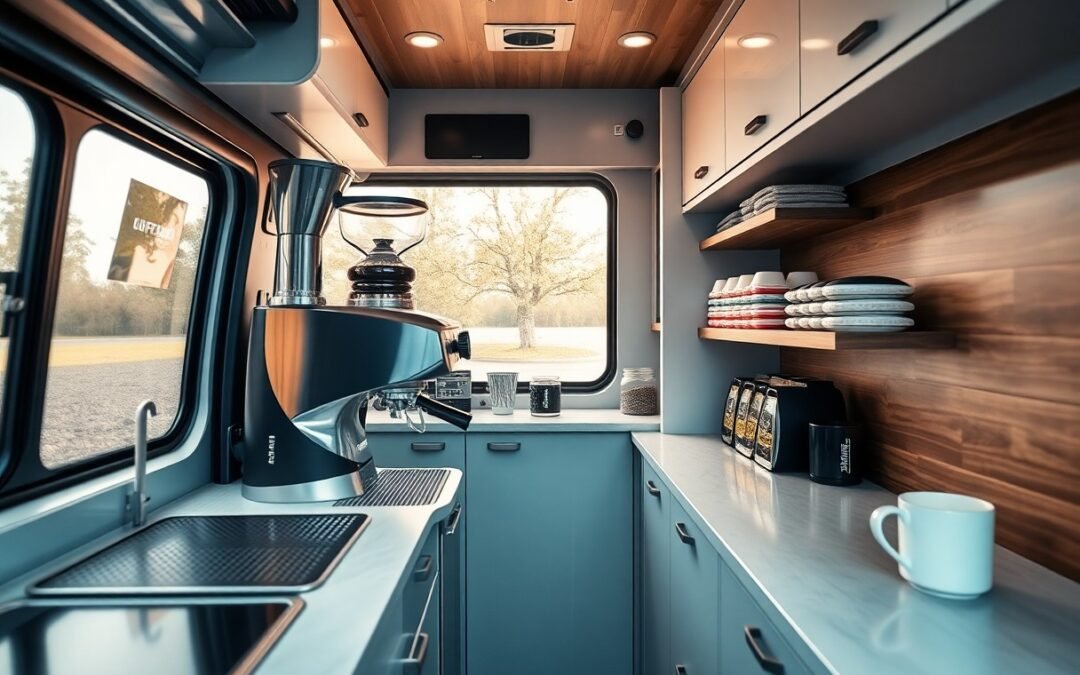Equipment selection significantly impacts your mobile coffee business’s success and efficiency. You need to consider various factors such as space, portability, and functionality to ensure your setup meets your specific needs. From espresso machines to grinders and brewing tools, each piece of equipment plays a vital role in consistently delivering high-quality coffee. This guide will help you navigate through the necessary components and make informed choices tailored to your mobile coffee van’s unique demands.

Deciphering Your Target Market
Analyzing Customer Demographics
Understanding the demographics of your target market lays the foundation for your mobile coffee business. Start by identifying key factors such as age, gender, income level, and occupation. For instance, if your customer base skews younger, you might find greater success in urban areas, near universities, or during events that attract this demographic. Data from the National Coffee Association indicates that millennials are the most enthusiastic coffee consumers, contributing to over 44% of coffee purchases in the U.S. Tailoring your offerings to this group could involve showcasing artisanal options or trendy cold brews that resonate with their preferences.
Dive deeper into lifestyle habits to further refine your understanding. Are your potential customers health-conscious individuals who prefer organic, fair-trade options? Or are they busy professionals who value convenience and speed? Engaging with your audience through surveys or social media can provide direct insights, allowing you to adjust your menu and services accordingly.
Understanding Consumer Preferences
Consumer preferences in the coffee market have evolved, driven by trends, innovations, and cultural influences. Today’s coffee drinkers often seek unique flavor profiles and ethical sourcing. By analyzing regional preferences, you can enhance your offerings—whether it’s introducing local roasts or seasonal flavors. For example, areas known for their coffee culture might appreciate specialty drinks that highlight local ingredients or brewing techniques.
Your mobile coffee van should act as an extension of your customers’ lifestyles. Consider incorporating popular alternatives like oat milk or non-caffeinated beverages to cater to diverse tastes. Additionally, promoting your commitment to sustainability can capture the attention of eco-conscious customers, as many consumers are willing to pay a premium for environmentally friendly options. Leveraging these insights can position your brand to better meet the evolving demands of the market.

Essential Equipment Foundation
Your foundation for mobile coffee success begins with selecting the right coffee machine. The machine you choose directly affects the quality of the beverages you serve, impacting customer satisfaction and repeat business. Consider factors such as brewing speed, capacity, and mobility. For instance, an espresso machine that can handle high volumes may be ideal for event settings, while a compact model may suit smaller venues. Investing in a reliable machine from reputable brands ensures longevity and performance, and you can learn more about vital insights in the 7 Things I Wish I Knew Before Starting A Mobile Coffee Cart.
Choosing the Right Coffee Machine
Focus on the type of coffee you plan to serve. If your emphasis is on espresso-based drinks, a high-performance espresso machine with a steam wand will be vital. Evaluate whether you prefer a semi-automatic or fully automatic machine, as this will affect your workflow and the skill level required. Moreover, assess your budget; while premium machines can be a significant investment, they often pay off in durability and performance over time.
Selecting Complementary Equipment
A successful mobile coffee setup includes complementary equipment that enhances your overall offering. Key items such as grinders, blenders, and milk frothers should not be overlooked. The grinder, for instance, plays a pivotal role in the freshness and taste of your coffee. Opt for a burr grinder that produces a consistent grind size, as this is critical for brewing quality. Additionally, if you plan to offer blended drinks, investing in a powerful blender will cater to a wider customer base.
Pay attention to the equipment that supports the primary coffee machine. Consider items such as water filtration systems to ensure the best taste and quality in every cup, along with a scale for precise measurements. Including a compact refrigerator for milk storage and other perishables further elevates your operation. Assess your space and balance the equipment’s footprint with your menu goals to create an efficient workflow that serves customers quickly and effectively.
Balancing Quality and Cost
Evaluating Budget Constraints
Assessing your budget is the first step in balancing quality and cost for your mobile coffee van equipment. Start by outlining all potential expenses, including initial purchases, ongoing maintenance, and operation costs. A high-end espresso machine might retail for $20,000, while a solid, mid-range model can offer similar functionality for about $10,000. Analyze your cash flow to determine how much you can allocate without jeopardizing other aspects of your business. Consider seeking financing options if you find the ideal equipment just out of reach.
Prioritize must-have equipment over nice-to-have items to keep your initial investment within your means. Focus on vital tools like espresso machines, grinders, and brewing devices that deliver consistent quality. For example, investing in a reliable grinder can dramatically affect your coffee’s taste, setting your brand apart in a competitive market. Look for second-hand options or equipment sale events during off-seasons to stretch your budget further.
Long-Term Investment Versus Short-Term Savings
Selecting equipment based solely on short-term costs often leads to higher expenses down the line. While a cheaper espresso machine may seem appealing, it might not withstand daily use, requiring replacements or repairs sooner than higher-quality models. Brands like La Marzocco and Synesso, although pricier, are known for their durability and reliability, often lasting a decade or more with proper care. This can save you money in the long run, making them a valuable addition to your business strategy.
Choosing equipment that aligns with your long-term business goals enhances sustainability and profitability. Investing in quality gear often means fewer breakdowns, lower maintenance costs, and consistently high-quality beverages. Aim for products that have proven performance records in the industry. Long-term benefits also come from maintaining strong customer satisfaction through premium service experiences, which can significantly boost repeat business and brand loyalty.
Navigating Regulatory Requirements
Health and Safety Standards
Understanding health and safety standards in your area is vital for operating a mobile coffee van. Most regions require compliance with food safety laws, which govern everything from ingredient storage temperatures to sanitary handling practices. Familiarize yourself with standards set by organizations such as the Food and Drug Administration (FDA) in the U.S. or local health departments in other regions. Regularly inspecting your equipment, maintaining proper hygiene practices, and ensuring that your staff is trained in food safety will significantly mitigate health risks while fostering customer confidence.
Installation of equipment must also comply with local regulations. This may include using stainless steel surfaces, having adequate wastewater disposal systems, and ensuring that all equipment meets electrical codes. Inspections by health officials can occur any time, so keeping your operation up to standard not only keeps you compliant but also enhances the overall quality of your service.
Licensing and Permits
Obtaining the necessary licenses and permits is non-negotiable in the mobile coffee industry. Different regions have specific licensing requirements that can include business licenses, food service permits, and mobile vendor permits. Each type of license has its own application process and associated fees, so research is necessary to understand your obligations fully. For instance, in many areas, you may need to submit plans for your mobile unit for health department approval before beginning operations.
Beyond general permits, you might also need to consider additional certifications, such as food handler’s permits for your staff, which ensure that everyone is trained in safe food handling procedures. Local regulations can vary widely, so connecting with your local chamber of commerce or small business association can provide helpful guidance.
Licensing and permit requirements can change based on location or new regulations, so ongoing communication with regulatory agencies is advisable. Keeping your paperwork organized and up-to-date helps avoid unexpected interruptions to your service. Regularly check for new ordinances that may affect your business, and ensure your documentation is in order to maintain smooth operations.

Future-Proofing Your Choices
Trends in Mobile Coffee Service
Anticipating trends in mobile coffee service can significantly influence your equipment decisions. A growing number of consumers are leaning towards specialty brews and artisanal coffee, prompting the need for high-quality grinders and brewing methods. In addition, sustainability is increasingly becoming a purchasing factor, leading many operators to invest in environmentally friendly equipment such as energy-efficient machines and biodegradable disposables. Familiarizing yourself with these trends can help ensure your mobile coffee business remains relevant and attracts a loyal customer base.
Furthermore, the rise of mobile payment solutions cannot be overlooked; integrating cashless options such as mobile wallets or contactless payments is crucial. Statistics indicate that over 50% of consumers prefer using cards or mobile payments for their transactions. You may consider choosing equipment that accommodates technology-driven payment systems to enhance customer convenience and drive sales.
Adapting to Emerging Technologies
Being attuned to emerging technologies is key to staying competitive in the mobile coffee industry. For example, automated brewing systems are becoming popular for their precision and efficiency, allowing you to maintain quality while reducing labor costs. Investing in connected coffee machines that can be monitored and controlled via mobile apps provides you with real-time data on performance and maintenance needs, ensuring optimal operation at all times.
Keeping pace with technological advancements can also open doors to innovative customer engagement strategies. Applications that allow customers to pre-order and pay in advance can streamline service and improve customer satisfaction. By prioritizing adaptability in your equipment choices, you’ll be better positioned to incorporate future innovations into your mobile coffee operations seamlessly.
Conclusion
The process of choosing the perfect mobile coffee van equipment requires careful consideration of your specific needs and business goals. You should evaluate factors such as the size of your van, the volume of coffee you plan to serve, and the range of beverages you wish to offer. Investing in quality equipment will not only enhance your coffee offerings but also improve customer satisfaction and retention.
Additionally, it’s necessary to prioritize equipment that is easy to maintain and has a solid support network for service and repairs. You may want to consider the latest technology that can streamline operations, such as point-of-sale systems and coffee grinders. By focusing on these elements, you can create an efficient and effective mobile coffee business that meets your customers’ demands and keeps them coming back for more.
FAQ
Q: What important equipment do I need for my mobile coffee van?
A: Essential equipment includes an espresso machine, coffee grinder, water filtration system, brewing devices (like Aeropress or pour-over), a refrigerator, storage containers for beans, and serving utensils. Additionally, consider items for customer service, such as a cash register or mobile payment system.
Q: How do I select the right espresso machine for my coffee van?
A: Choose an espresso machine based on your volume requirements, available space, and the types of coffee beverages you plan to offer. Look for a compact, reliable machine with easy maintenance and strong customer reviews that suit your budget.
Q: What factors should I consider when choosing a coffee grinder?
A: Consider grind precision, size, and speed. A burr grinder is often preferred for consistency. Assess your production needs to select one that can efficiently handle daily volume while fitting within your mobile setup.
Q: Is a water filtration system necessary for a mobile coffee van?
A: Yes, a water filtration system is important to ensure high-quality coffee. It removes impurities and enhances flavor while extending the lifespan of your equipment. Look for a system compatible with your water supply and space constraints.
Q: What storage solutions should I consider for a mobile coffee van?
A: Opt for airtight containers for coffee beans to maintain freshness, and consider shelf or bin systems for organizing supplies. Space-efficient storage solutions, such as removable storage bins, can maximize your limited area without sacrificing accessibility.

